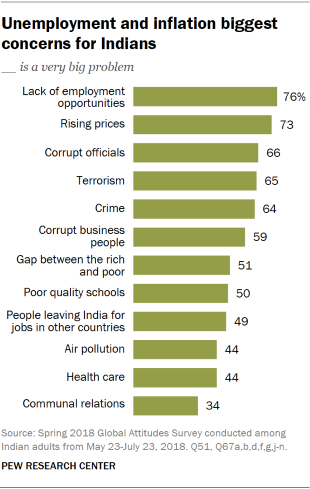India
is voting for a new Parliament. That’s a gigantic exercise, with over 900
million people on the voters ‘roll. It takes over five weeks to complete. But
people trust the electoral authorities and that’s very good news. India’s
electoral commission is an example to be followed by many developing nations. Particularly
if one considers that the Indian political class is seen as very corrupt. There
is a difference between the politicians and the senior civil servants. Functionaries
are well prepared and very professional in the performance of their duties. And
that’s why the electoral system is trusted. There is no political influence in
the system.
The
table below shows the main concerns the voters have in their hearts and minds. Jobs
remain a major issue. India has nowadays millions of young university graduates.
But not enough jobs for them. Many end up by performing low-skilled and
low-paid tasks. They feel very frustrated.
However,
there is hope in the future. When I visited last time, after twenty years
without being back, I found a country that is modernising fast and full of
optimism.
Prime
Minister Narendra Modi might win the elections this time again. He is seen as resolute,
clear-minded. However, I think his approach towards the Muslim Indians is not
appropriate. He puts too much emphasis on the Hindu side of the culture, forgetting
that India is a multicultural society and that social peace can only be achieved
by politics of inclusiveness. Let's hope he goes back to a more balanced approach once the elections are over.

No comments:
Post a Comment